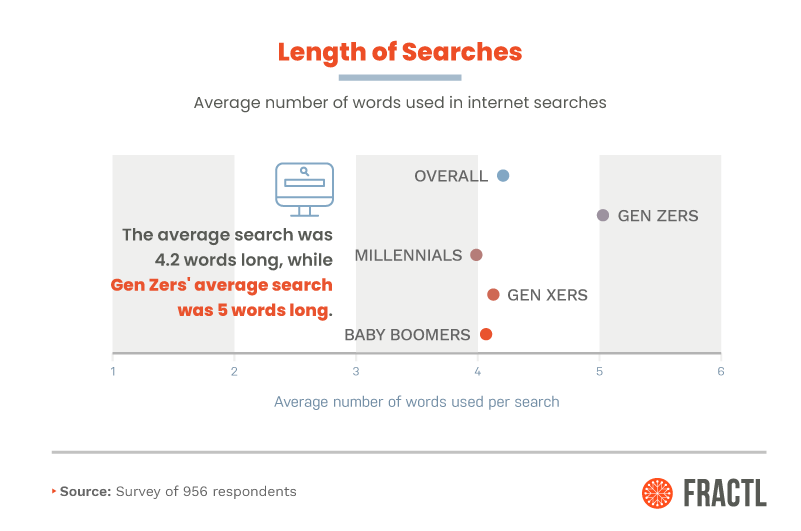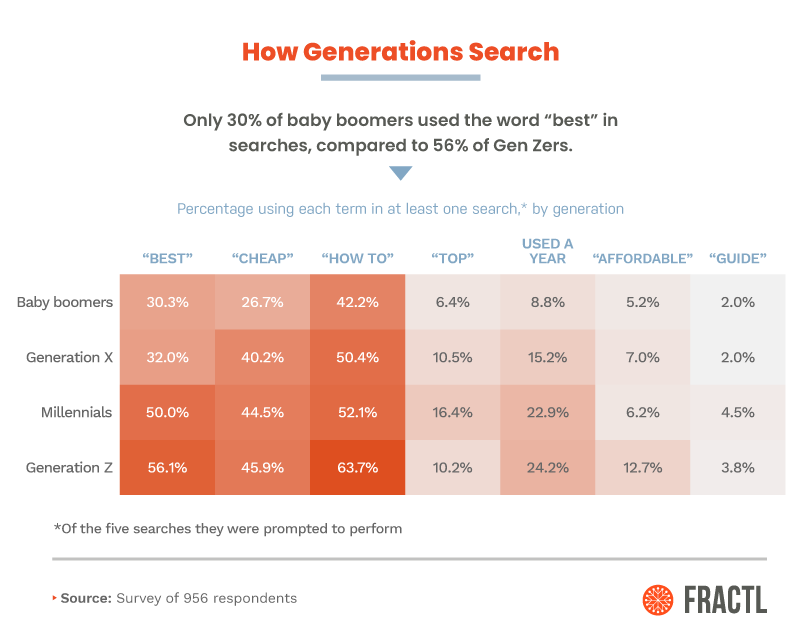The more we understand the search intent of our target audience, the better we can meet that intent with top-quality content that answers their questions and curiosities.
We can acquire this understanding through various research tools, but they can’t tell the whole story.
And we were curious: How can we better understand the way our target audience searches so that we can tailor our content to the appropriate inquiries? That’s an ongoing quest – but this time around, we focused on age demographics.
We surveyed more than 950 respondents about their search processes based on five hypothetical scenarios:
- You just got engaged. It’s time to start thinking about the wedding, but you’re not sure where to start.
- You’re hungry and want to dine out, but you’re not sure what you’re in the mood for and want to try a new restaurant.
- You want to buy a new camera, but you want to learn more about different brands and options.
- You want to make a homemade puzzle as a gift, but you’re not sure how.
- You want to book an affordable flight to Florida for an upcoming vacation.
Here’s what we found.
Generation Z: Lovers of Longtail Search?
We looked at all search response lengths by generation to see who typed more or less, on average.
Gen Zers had a clear lead in terms of using the longest queries over other generations.
This was certainly interesting to see; perhaps as people become more comfortable with search engines and more confident that there will be a particular result for what they’re looking for, they’re more likely to be quite specific in their queries.
However, one aspect may hinder that hypothesis: Millennials had the shortest queries, on average.
But differences didn’t just arise in the number of words – they also appeared in the diction.
“How to” Find the “Best” Searchers
Another key component we examined was word choice. How would different generations refer to similar concepts?
Did they search for what was “top” or “best”? Did they want to know “how to” do something or want a “guide” on it?
Younger generations certainly seemed to have a higher propensity toward caring about what is “best.” This could be because millennials and Gen Zers have grown up in an age where rating sites exist, and it’s possible to research the “best” options for just about anything.
While these composite looks are fascinating, more can be uncovered when looking at each hypothetical scenario, as they all have their nuances.
The flipbook below breaks down the search insights for each of the five hypothetical situations.
Consider these findings and how they can apply to your vertical and target audience!
Methodology
We surveyed 956 Americans on Amazon’s Mechanical Turk survey platform. Forty-three of those respondents were disqualified for entering gibberish or spam, or for missing an attention-check question about midway through our survey. Respondents were shown a series of questions, including five search prompts, and asked what they would type into Google or a similar search engine when performing each search.
Responses were given in text form and were first normalized before being analyzed for one-word, two-word, and keyword/phrase frequencies.
Respondents’ ages ranged from 18 to 72. There were 251 baby boomers, 256 Gen Xers, 292 millennials, and 157 Gen Zers.
Limitations: There are issues with self-reported data, which include but are not limited to telescoping, selective memory, lying, and internet trolling.





